外研版英语必修3同步教学课件:Module 3 The Violence of Nature Section Ⅱ Grammar课件
文档属性
| 名称 | 外研版英语必修3同步教学课件:Module 3 The Violence of Nature Section Ⅱ Grammar课件 |  | |
| 格式 | zip | ||
| 文件大小 | 322.4KB | ||
| 资源类型 | 教案 | ||
| 版本资源 | 外研版 | ||
| 科目 | 英语 | ||
| 更新时间 | 2017-01-01 22:29:06 | ||
图片预览



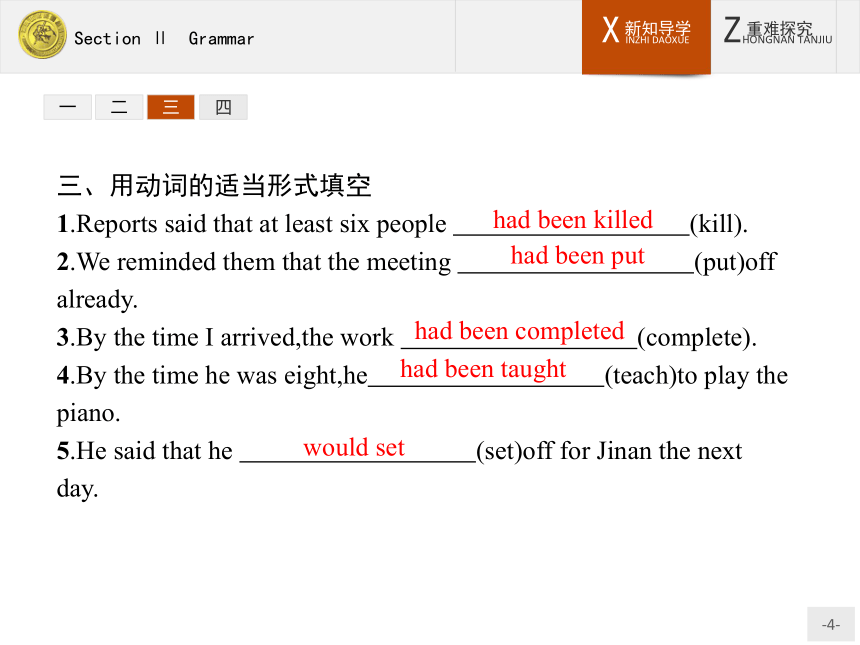
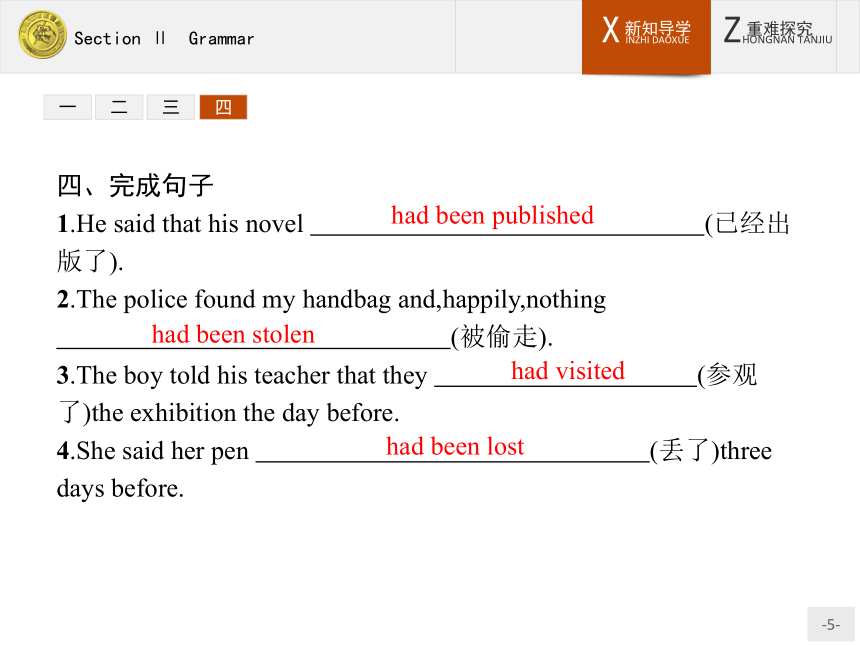
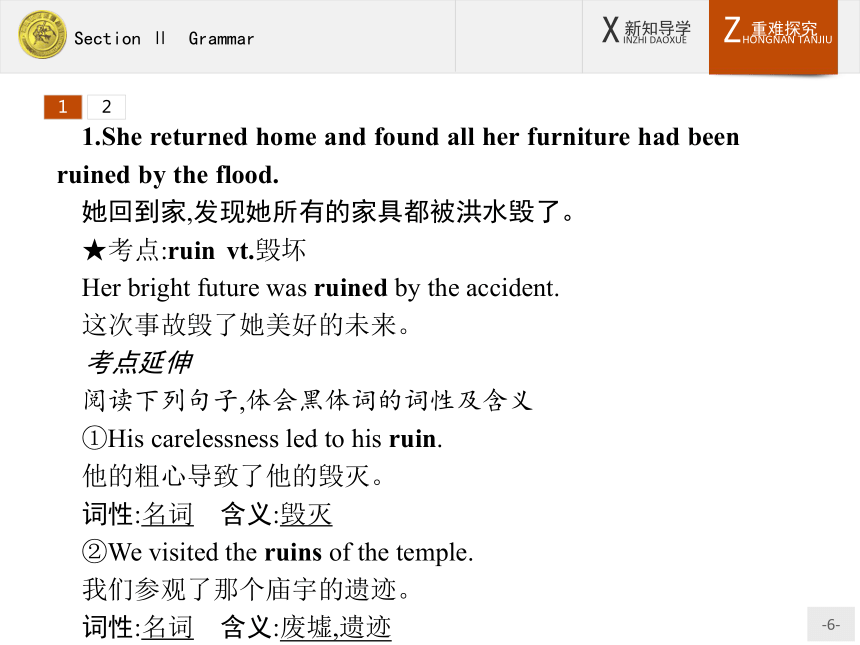
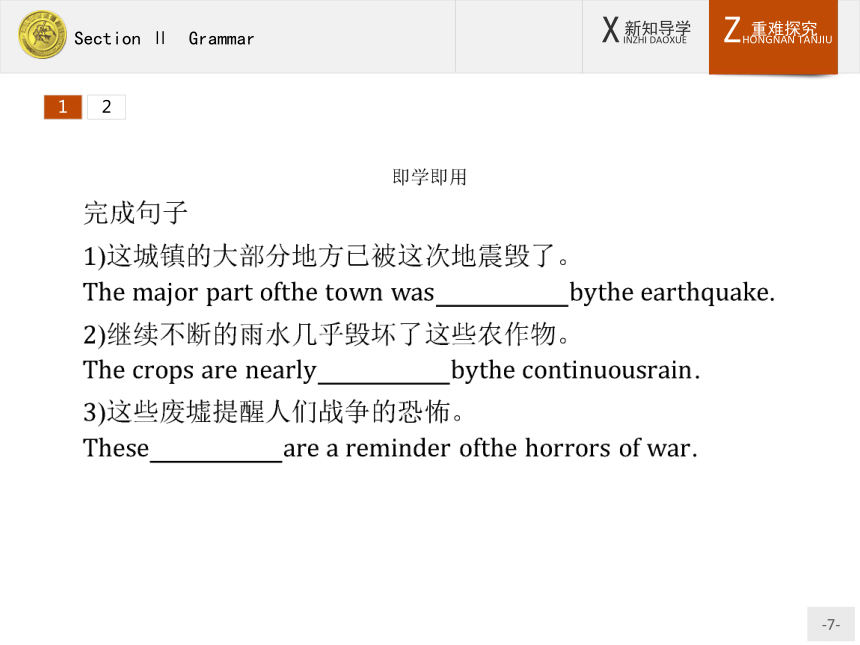
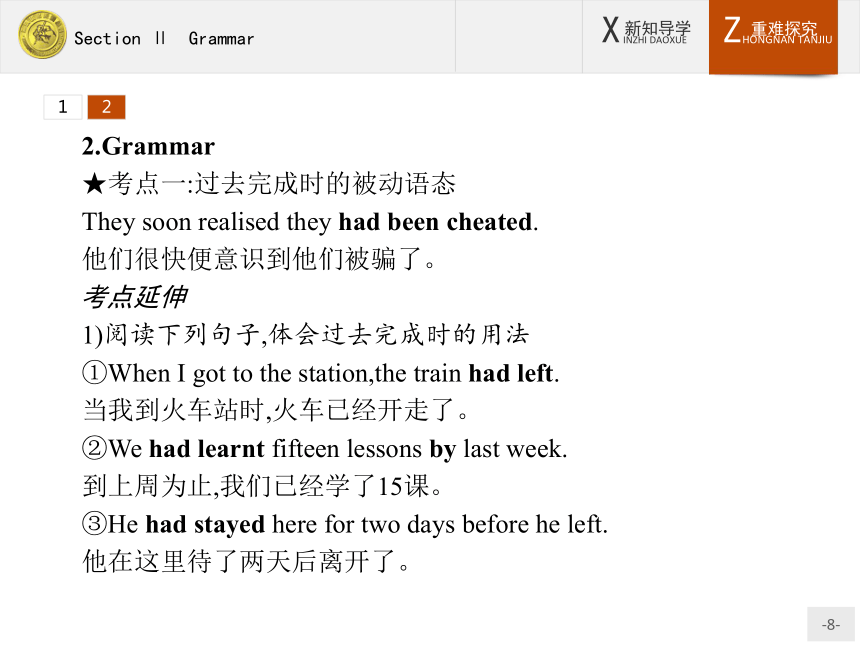
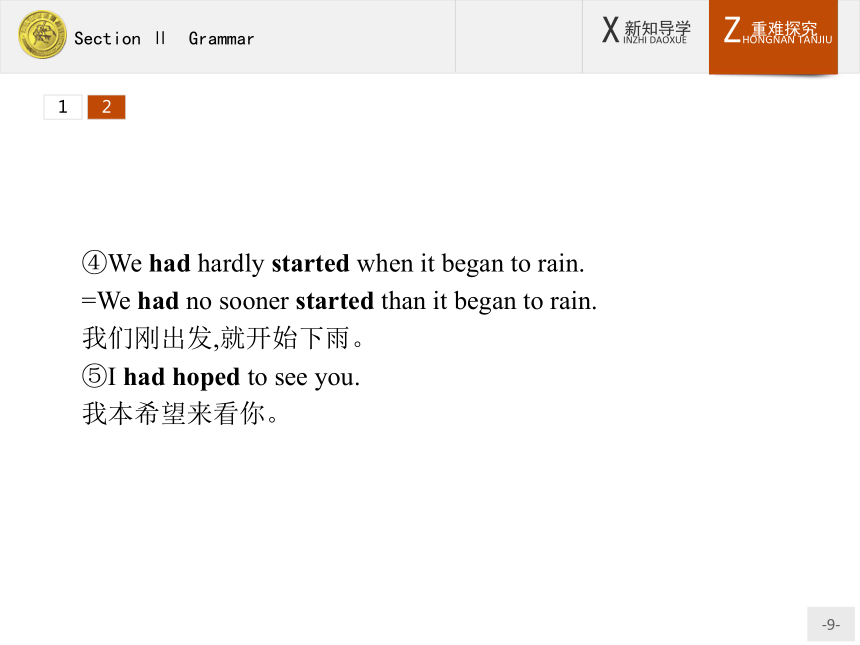
文档简介
课件22张PPT。Section Ⅱ Grammar一二三四一、读下列句子,完成题后练习
1.By the time it ended,more than 700 people had been killed and 2,700 had been injured.
2.By the late 1890s,he had moved to Galveston.
3.He said he had been to Beijing twice.
4.Coghlan travelled back to Canada after he had been buried in Texas!
剖析:以上四个句子都使用了 (时态),其中,第一句和第四句为 语态,句子的主语是谓语动词动作的承受者,即有 关系;第二句和第三句为 语态,句子的主语是谓语动词动作的发出者,即有 关系。?过去完成时 被动 动宾 主动 主谓 一二三四二、根据给出的直接引语,完成下列句子
1.I’m busy.
→He said that busy.?
2.I’ll do it after class.
→He said that he do it after class.?
3.Do you enjoy reading?
→He asked me reading.?
4.When did you get up this morning?
→He asked me I up
morning.?he was would if/whether I enjoye when had got that 一二三四三、用动词的适当形式填空
1.Reports said that at least six people (kill).?
2.We reminded them that the meeting (put)off already.?
3.By the time I arrived,the work (complete).?
4.By the time he was eight,he (teach)to play the piano.?
5.He said that he (set)off for Jinan the next day.?had been killed had been put had been completedhad been taught would set 一二三四四、完成句子
1.He said that his novel (已经出版了).?
2.The police found my handbag and,happily,nothing
(被偷走).?
3.The boy told his teacher that they (参观了)the exhibition the day before.?
4.She said her pen (丢了)three days before.?had been published had been stolen had visited had been lost 121.She returned home and found all her furniture had been ruined by the flood.
她回到家,发现她所有的家具都被洪水毁了。
★考点:ruin vt.毁坏
Her bright future was ruined by the accident.
这次事故毁了她美好的未来。
考点延伸
阅读下列句子,体会黑体词的词性及含义
①His carelessness led to his ruin.
他的粗心导致了他的毁灭。
词性:名词 含义:毁灭
②We visited the ruins of the temple.
我们参观了那个庙宇的遗迹。
词性:名词 含义:废墟,遗迹12122.Grammar
★考点一:过去完成时的被动语态
They soon realised they had been cheated.
他们很快便意识到他们被骗了。
考点延伸
1)阅读下列句子,体会过去完成时的用法
①When I got to the station,the train had left.
当我到火车站时,火车已经开走了。
②We had learnt fifteen lessons by last week.
到上周为止,我们已经学了15课。
③He had stayed here for two days before he left.
他在这里待了两天后离开了。12④We had hardly started when it began to rain.
=We had no sooner started than it began to rain.
我们刚出发,就开始下雨。
⑤I had hoped to see you.
我本希望来看你。12归纳:①过去完成时表示动作或状态在过去某个时间或动作之前发生,即“过去的过去”。
②“by+过去时间点”常与过去完成时连用。
③当句中由before或after引导时间状语从句时,如果后发生的动作用一般过去时,则先发生的动作可用过去完成时,也可用一般过去时。
④常用句型“hardly...when...”或“no sooner...than...”意为“刚……就……”,主句中用过去完成时,when/than从句中用一般过去时。
⑤表示计划、打算或希望的动词,如:expect,hope,mean,suppose,think,want,plan,intend等的过去完成时表示过去未实现的计划、打算等。122)阅读下列句子,体会被动语态的各种时态
①Visitors are not allowed to touch the exhibits.
禁止参观者触摸展品。
时态:一般现在时 形式:am/is/are+过去分词
②All the preparations for the task have been completed.
那项任务的准备工作已经完成。
时态:现在完成时 形式:have/has been+过去分词?
③A new cinema is being built here.
这里正在建造一个新影院。
时态:现在进行时 形式:am/is/are+being+过去分词12④I was given ten minutes to decide whether I should accept the offer.
我被给予10分钟来决定是否接受所提供的帮助。
时态:一般过去时 形式:was/were+过去分词
⑤By the end of last year,another new stadium had been built in Beijing.
到去年年底,北京已经建成了另一座新的体育馆。
时态:过去完成时 形式:had been+过去分词?
⑥A meeting was being held when I arrived there.
我到那里时,正在开会。
时态:过去进行时 形式:was/were+being+过去分词
⑦Hundreds of jobs will be lost if the factory closes.
如果工厂关门,将失去数百工作岗位。
时态:一般将来时 形式:will be+过去分词?1212★考点二:间接引语
She said,“I have lost a pen.”→She said she had lost a pen.
她说她丢了一支钢笔。
考点延伸
1)阅读下列句子,体会时态的变化
①The girl said,“I am very happy now.”
→The girl said that she was very happy then.
时态变化:一般现在时变成一般过去时
②Tom said,“We are listening to the pop music.”
→Tom said that they were listening to the pop music.
时态变化:现在进行时变成过去进行时12③Mother asked,“Have you finished your homework before you watch TV?”
→Mother asked me whether I had finished my homework before I watched TV.
时态变化:现在完成时变成过去完成时
④“Why did she refuse to come here?” the teacher asked.
→The teacher asked why she had refused to go there.
时态变化:一般过去时变成过去完成时
⑤He said,“I will go and get it.”
→He said that he would go and get it.
时态变化:一般将来时变成过去将来时12⑥Mother asked me,“Had you finished your task before you returned home?”
→Mother asked me whether I had finished my task before I returned home.
Tom said,“We were having a football match this time yesterday.”
→Tom said that they were having a football match that time the day before.
时态变化:过去完成时和过去进行时不变
⑦He said,“I went to college in 1994.”
→He told us that he went to college in 1994.
时态变化:当直接引语部分带有具体的过去时间状语时,一般过去时不变12⑧Our teacher said to us,“Light travels faster than sound.”
→Our teacher told us that light travels faster than sound.
时态变化:当直接引语是客观真理或自然现象或格言、谚语时,时态不变122)阅读下列句子,体会代词的变化
①She said,“My brother wants to go with me.”
→She said her brother wanted to go with her.
②“You should be more careful next time,” my father told me.
→My father told me that I should be more careful the next time.
③She said to her son,“I’ll check your homework tonight.”
→She told her son that she would check his homework that night.
④He said,“These books are mine.”
→He said those books were his.123)阅读下列句子,体会黑体词部分的变化
①She said,“I won’t come here any more.”
→She said that she wouldn’t go there any more.
②He said,“I’m out now.”
→He said that he was out then.
③He said,“I want to leave today.”
→He said that he wanted to leave that day.
④He said,“She left yesterday.”
→He said that she had left the day before.
⑤She said,“I’ll tell you tomorrow.”
→She said that she would tell me the next day.124)阅读下列句子,体会句式的变化
①He said,“You are younger than I.”
→He said (that)I was younger than him.
②She said,“Do you often come here to read newspapers?”
→She asked me if (或whether)I often went there to read newspapers.
③I asked him,“Will you stay at home or go to the cinema tonight?”
→I asked him whether he would stay at home or go to the cinema that night.
④He asked,“Where do you live?”
→He asked me where I lived.
⑤The teacher said to the boy,“Open the window.”
→The teacher told the boy to open the window.1212
1.By the time it ended,more than 700 people had been killed and 2,700 had been injured.
2.By the late 1890s,he had moved to Galveston.
3.He said he had been to Beijing twice.
4.Coghlan travelled back to Canada after he had been buried in Texas!
剖析:以上四个句子都使用了 (时态),其中,第一句和第四句为 语态,句子的主语是谓语动词动作的承受者,即有 关系;第二句和第三句为 语态,句子的主语是谓语动词动作的发出者,即有 关系。?过去完成时 被动 动宾 主动 主谓 一二三四二、根据给出的直接引语,完成下列句子
1.I’m busy.
→He said that busy.?
2.I’ll do it after class.
→He said that he do it after class.?
3.Do you enjoy reading?
→He asked me reading.?
4.When did you get up this morning?
→He asked me I up
morning.?he was would if/whether I enjoye when had got that 一二三四三、用动词的适当形式填空
1.Reports said that at least six people (kill).?
2.We reminded them that the meeting (put)off already.?
3.By the time I arrived,the work (complete).?
4.By the time he was eight,he (teach)to play the piano.?
5.He said that he (set)off for Jinan the next day.?had been killed had been put had been completedhad been taught would set 一二三四四、完成句子
1.He said that his novel (已经出版了).?
2.The police found my handbag and,happily,nothing
(被偷走).?
3.The boy told his teacher that they (参观了)the exhibition the day before.?
4.She said her pen (丢了)three days before.?had been published had been stolen had visited had been lost 121.She returned home and found all her furniture had been ruined by the flood.
她回到家,发现她所有的家具都被洪水毁了。
★考点:ruin vt.毁坏
Her bright future was ruined by the accident.
这次事故毁了她美好的未来。
考点延伸
阅读下列句子,体会黑体词的词性及含义
①His carelessness led to his ruin.
他的粗心导致了他的毁灭。
词性:名词 含义:毁灭
②We visited the ruins of the temple.
我们参观了那个庙宇的遗迹。
词性:名词 含义:废墟,遗迹12122.Grammar
★考点一:过去完成时的被动语态
They soon realised they had been cheated.
他们很快便意识到他们被骗了。
考点延伸
1)阅读下列句子,体会过去完成时的用法
①When I got to the station,the train had left.
当我到火车站时,火车已经开走了。
②We had learnt fifteen lessons by last week.
到上周为止,我们已经学了15课。
③He had stayed here for two days before he left.
他在这里待了两天后离开了。12④We had hardly started when it began to rain.
=We had no sooner started than it began to rain.
我们刚出发,就开始下雨。
⑤I had hoped to see you.
我本希望来看你。12归纳:①过去完成时表示动作或状态在过去某个时间或动作之前发生,即“过去的过去”。
②“by+过去时间点”常与过去完成时连用。
③当句中由before或after引导时间状语从句时,如果后发生的动作用一般过去时,则先发生的动作可用过去完成时,也可用一般过去时。
④常用句型“hardly...when...”或“no sooner...than...”意为“刚……就……”,主句中用过去完成时,when/than从句中用一般过去时。
⑤表示计划、打算或希望的动词,如:expect,hope,mean,suppose,think,want,plan,intend等的过去完成时表示过去未实现的计划、打算等。122)阅读下列句子,体会被动语态的各种时态
①Visitors are not allowed to touch the exhibits.
禁止参观者触摸展品。
时态:一般现在时 形式:am/is/are+过去分词
②All the preparations for the task have been completed.
那项任务的准备工作已经完成。
时态:现在完成时 形式:have/has been+过去分词?
③A new cinema is being built here.
这里正在建造一个新影院。
时态:现在进行时 形式:am/is/are+being+过去分词12④I was given ten minutes to decide whether I should accept the offer.
我被给予10分钟来决定是否接受所提供的帮助。
时态:一般过去时 形式:was/were+过去分词
⑤By the end of last year,another new stadium had been built in Beijing.
到去年年底,北京已经建成了另一座新的体育馆。
时态:过去完成时 形式:had been+过去分词?
⑥A meeting was being held when I arrived there.
我到那里时,正在开会。
时态:过去进行时 形式:was/were+being+过去分词
⑦Hundreds of jobs will be lost if the factory closes.
如果工厂关门,将失去数百工作岗位。
时态:一般将来时 形式:will be+过去分词?1212★考点二:间接引语
She said,“I have lost a pen.”→She said she had lost a pen.
她说她丢了一支钢笔。
考点延伸
1)阅读下列句子,体会时态的变化
①The girl said,“I am very happy now.”
→The girl said that she was very happy then.
时态变化:一般现在时变成一般过去时
②Tom said,“We are listening to the pop music.”
→Tom said that they were listening to the pop music.
时态变化:现在进行时变成过去进行时12③Mother asked,“Have you finished your homework before you watch TV?”
→Mother asked me whether I had finished my homework before I watched TV.
时态变化:现在完成时变成过去完成时
④“Why did she refuse to come here?” the teacher asked.
→The teacher asked why she had refused to go there.
时态变化:一般过去时变成过去完成时
⑤He said,“I will go and get it.”
→He said that he would go and get it.
时态变化:一般将来时变成过去将来时12⑥Mother asked me,“Had you finished your task before you returned home?”
→Mother asked me whether I had finished my task before I returned home.
Tom said,“We were having a football match this time yesterday.”
→Tom said that they were having a football match that time the day before.
时态变化:过去完成时和过去进行时不变
⑦He said,“I went to college in 1994.”
→He told us that he went to college in 1994.
时态变化:当直接引语部分带有具体的过去时间状语时,一般过去时不变12⑧Our teacher said to us,“Light travels faster than sound.”
→Our teacher told us that light travels faster than sound.
时态变化:当直接引语是客观真理或自然现象或格言、谚语时,时态不变122)阅读下列句子,体会代词的变化
①She said,“My brother wants to go with me.”
→She said her brother wanted to go with her.
②“You should be more careful next time,” my father told me.
→My father told me that I should be more careful the next time.
③She said to her son,“I’ll check your homework tonight.”
→She told her son that she would check his homework that night.
④He said,“These books are mine.”
→He said those books were his.123)阅读下列句子,体会黑体词部分的变化
①She said,“I won’t come here any more.”
→She said that she wouldn’t go there any more.
②He said,“I’m out now.”
→He said that he was out then.
③He said,“I want to leave today.”
→He said that he wanted to leave that day.
④He said,“She left yesterday.”
→He said that she had left the day before.
⑤She said,“I’ll tell you tomorrow.”
→She said that she would tell me the next day.124)阅读下列句子,体会句式的变化
①He said,“You are younger than I.”
→He said (that)I was younger than him.
②She said,“Do you often come here to read newspapers?”
→She asked me if (或whether)I often went there to read newspapers.
③I asked him,“Will you stay at home or go to the cinema tonight?”
→I asked him whether he would stay at home or go to the cinema that night.
④He asked,“Where do you live?”
→He asked me where I lived.
⑤The teacher said to the boy,“Open the window.”
→The teacher told the boy to open the window.1212
